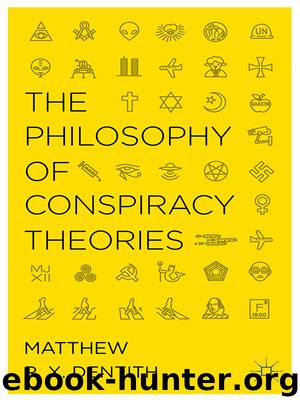THE PHILOSOPHY OF CONSPIRACY THEORIES by MATTHEW R. X. DENTITH

Author:MATTHEW R. X. DENTITH [DENTITH, MATTHEW R. X.]
Language: eng
Format: epub
ISBN: 9781137363176
Publisher: Palgrave Macmillan
Published: 2014-08-15T18:30:00+00:00
8
Should We Prefer Official Theories?
There is a view found in the work of several conspiracy theory theorists that goes something like this: theories with official status – to wit, theories endorsed by some powerful institution – that happen to cite conspiratorial activity cannot be conspiracy theories.
Take, for example, the Moscow Show Trials of the 1930s (which were discussed in the previous chapter). We know the verdicts were the result of a conspiracy. The conspiratorial machinations of Stalin and his cronies are now part of the standard histories of Soviet Russia. For some, this means that this particular conspiratorial explanation is not a conspiracy theory. Why? Well, because the theory has been endorsed by influential institutions: academic, with respect to historians, sociologists and the like; and political, with respect to the Russian government. Thus, the story of the Moscow Show Trials is what we might call an ‘official theory’ and such theories are not typically considered to be conspiracy theories. The same can be said of the Shoah: the explanation of the Nazi programme to eradicate the Jewish people in Europe during the 1930s and 1940s features elements of conspiracy, but, as it is part of our orthodox history, we would not typically call it a ‘conspiracy theory’.
The notion that conspiracy theories are never official theories is an interesting proposition. It respects an intuition shared by some that the term ‘conspiracy theory’ has pejorative implications – and thus cannot be a theory that is part of the orthodoxy – or that conspiracy theories are, in some sense, unofficial.
Michael J. Wood and Karen M. Douglas, for example, contrast conspiracy theories with what they call ‘conventionalist explanations’, which are both warranted by the evidence and, in some sense, official. Wood and Douglas claim that ‘for people who hold a conspiracist worldview, the specifics of a conspiracy theory are less important than its identity as a conspiracy and its opposition to the official explanation’ (Wood & Douglas, 2013, p. 2).
Susan Feldman argues that we should distinguish between conspiracy theories and conspiratorial explanations that happen to be in some sense official. She takes it that conspiracy theories are examples of counter-narratives. She writes:
[A] conspiracy theory is a proposed explanation of events, contrary to an officially sanctioned alternative, involving the causal agency of a group of agents working together in secret, often or usually for a sinister purpose. (Feldman, 2011, pp. 15–16)
As we saw in the last chapter, there are several senses of ‘official’. Surely, then, in a world where conspiracies occur, we cannot privilege some theory merely because it is official? This seems like a particular problem for Feldman, because some of the official theories which these conspiracy theories are counter-narratives to end up being theories about the conspiratorial activities of the bodies that officially sanction the said official theories. So, just because some theory has official status, this, on the face of it, tells us little about the epistemic merits of the theory unless we can tell some story about why we might trust the accrediting institution.
Download
This site does not store any files on its server. We only index and link to content provided by other sites. Please contact the content providers to delete copyright contents if any and email us, we'll remove relevant links or contents immediately.
The remains of the day by Kazuo Ishiguro(8975)
Tools of Titans by Timothy Ferriss(8365)
Giovanni's Room by James Baldwin(7326)
The Black Swan by Nassim Nicholas Taleb(7106)
Inner Engineering: A Yogi's Guide to Joy by Sadhguru(6785)
The Way of Zen by Alan W. Watts(6600)
Asking the Right Questions: A Guide to Critical Thinking by M. Neil Browne & Stuart M. Keeley(5759)
The Power of Now: A Guide to Spiritual Enlightenment by Eckhart Tolle(5752)
The Six Wives Of Henry VIII (WOMEN IN HISTORY) by Fraser Antonia(5497)
Astrophysics for People in a Hurry by Neil DeGrasse Tyson(5182)
Housekeeping by Marilynne Robinson(4436)
12 Rules for Life by Jordan B. Peterson(4299)
Double Down (Diary of a Wimpy Kid Book 11) by Jeff Kinney(4261)
Ikigai by Héctor García & Francesc Miralles(4246)
The Ethical Slut by Janet W. Hardy(4242)
Skin in the Game by Nassim Nicholas Taleb(4239)
The Art of Happiness by The Dalai Lama(4125)
Skin in the Game: Hidden Asymmetries in Daily Life by Nassim Nicholas Taleb(3989)
Walking by Henry David Thoreau(3953)
